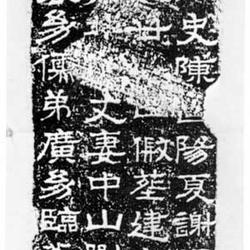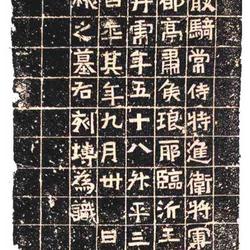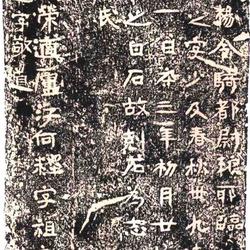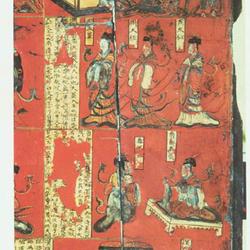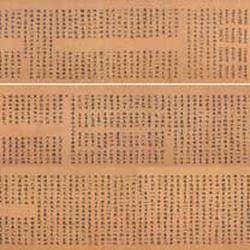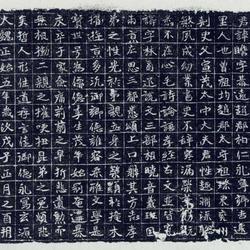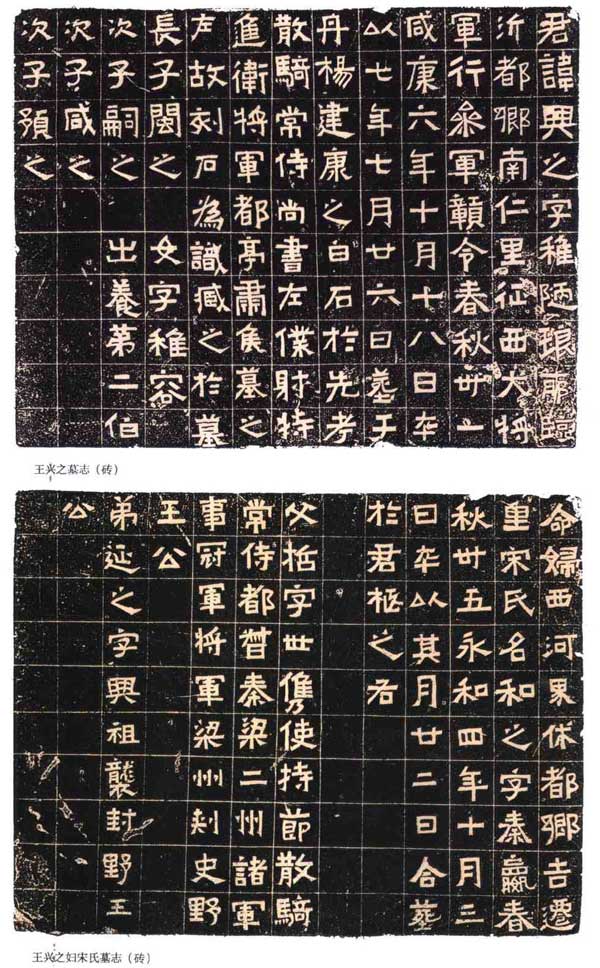
Explanation:
The king is taboo about Xingzhi, and his words are naive and crude. Langye is located in Nanrenli, the capital of Linyi. The general who conquered the west went to join the army and ordered Gan. Spring and Autumn thirty-one. He died on October 18th, the sixth year of Xiankang. On July 26, the seventh year, he was buried in Baishi, Danyang Jiankang, on the left side of the tombs of Xiankao Sanqi Changshi, Shangshu Zuopushe, Tejinwei General, and Duting Suhou. Therefore, the stone is carved as a sign of knowledge and hidden in the tomb.
The eldest son Minzhi. The female character is Yarong.
The second son went to the temple to raise his second uncle.
The second son Xianzhi.
The second is the first.
Mingfu lived in Jiqianli, Xiudu Township, Xihejie. Her surname was He Zhi, and her courtesy name was Qin Ying. She died on the 35th day of the Spring and Autumn Period, on October 3rd, the fourth year of Yonghe. On the twenty-second day of the month, they were buried together on the right side of your coffin.
Fu Zhe, whose courtesy name was Shijuan, was a regular servant of the Envoy Chijie Sanqi, the commander-in-chief of all military affairs in the Qin and Liang states, a champion general, an assassin in Liangzhou, and a wild prince. His younger brother Yanzhi was named Xingzu. Attack the wild prince.
On January 19, 1965, the "Epitaph of Wang Xingzhi and his Couple" from the Eastern Jin Dynasty was unearthed in Rentai Mountain outside Xinminmen, a suburb of Nanjing. The font on the epitaph is regular script with official meaning, similar to Cuan Baozi in the Southern Dynasties. The writing style is multi-faceted and the structure is clumsy. Because the owner of the tomb, Wang Xingzhi, was Wang Xizhi’s uncle and brother and a contemporary (the tomb stone was carved in the seventh year of Emperor Xiankang of Jin Dynasty, 341 AD), Mr. Guo Moruo based this on the sixth issue of "Cultural Relics" in 1965 He published an article "From the Excavation of Wang Xie's Epitaph to the Authenticity of the Lanting Preface" and agreed with Li Wentian of the Qing Dynasty that "there is no book about Youjun in the world. If there is one, it must be the same as Cuan Baozi" and "Cuan Baozi". The view of "Long Yan" is similar and then comparable" became popular for a while, and many people agreed with it. At that time, Mr. Gao Ershi, a Nanjing scholar, published an article titled "A Refutation of the Authenticity of the Lanting Preface" in Guangming Daily, thus launching the first major calligraphy debate since the founding of the People's Republic of China. On academic issues, everyone should express their own opinions and a hundred schools of thought contend. However, the political atmosphere at the time classified this academic debate as "the struggle between the materialist view of history and the idealist view of history." However, with the passage of time and the increasing number of unearthed cultural relics, this issue has gradually become clearer. In 1977, 374 inscribed bricks from the tomb of Cao Cao's clan were unearthed in Bo County, Anhui Province, dating from the seventh year of Yanxi (164) of the Eastern Han Dynasty to the third year of Jianning (170) of Emperor Ling. The fonts are 100% The seventy-fifth is regular script. It can be seen that as early as the Eastern Han Dynasty, two hundred years before Wang Xizhi wrote "Lanting Preface", regular script was already used among the people. Therefore, it is possible for Wang Xizhi of the Eastern Jin Dynasty to write calligraphy works such as "Lanting Preface" two hundred years later; this can also be proved in Loulan Slips and Juyan Slips. The font on the "Epitaph of Wang Xingzhi and his wife" belongs to the "stone inscription script", which is very different from the "Xingya script" such as "Lanting Preface". Just like regular script and official script were used to write tombstones in the past dynasties, the regularity and seriousness express the respect for the deceased. Because of their piety, tombstones are rarely written in cursive or cursive script. "Epitaph of Wang Xingzhi and His Couple" is simple and rigorous, square and powerful. Together with "Epitaph of Wang Minzhi" and "Epitaph of Wang Danhu" unearthed at the same time, it adds new varieties to the calligraphy of the Eastern Jin Dynasty.
For information, please refer to "Appreciation of Masterpieces of Calligraphy in Past Dynasties" by Huang Dun, Zhuang Xizu, Liu Shi and others (Jiangsu Fine Arts Publishing House)
Appendix: "From the Unearth of Wang Xie's Epitaph to the Authenticity of the Lanting Preface" (Guo Moruo)
——The epitaph of Wang Xingzhi and his wife
In recent years, several epitaphs from the Eastern Jin Dynasty have been unearthed in the suburbs of Nanjing and its approaches. Among them, the Epitaph of Wang Xingzhi and his Couple and the Epitaph of Xie Kun have the most historical value.
"The epitaph of Wang Xingzhi and his wife" was unearthed on January 19th this year (1965) at Xinminmenwairen Caoshan, Nanjing. It is a stone with inscriptions on both sides. The engraving on one side reads:
"The emperor taboos Xingzhi, with the word "childish". Langye is in Nanrenli, the capital of Linyi. The general who conquered the west went to join the army, Gan Order. Spring and Autumn 31st. He died on October 18th in the sixth year of Xiankang. In July of the seventh year On the 26th, he was buried in a white stone in Jiankang, Danyang, on the left side of the tomb of Xiankao Sanqi Changshi, Shangshu Zuopushe, Tejinwei general, and Duting Suhou. Therefore, the stone was carved for recognition and hidden in the tomb.
The eldest son Minzhi. The female character is Yarong.
The second son went to the temple to raise his second uncle.
The second son Xianzhi.
The second is the first. "
The engraving on the other side reads:
"My wife was named Qianli in Jiqian, Xidu Township, Xihejie. Her name was He Zhi, and her courtesy name was Qin Ying. She died in the 35th year of the Spring and Autumn Period on October 3rd in the fourth year of Yonghe. On the 22nd day of the month, she was buried together on the right side of the emperor's coffin.
Fu Zhe, whose courtesy name was Shijuan, was a regular servant of the Envoy Chijie Sanqi, the commander-in-chief of all military affairs in the Qin and Liang states, a champion general, an assassin in Liangzhou, and a wild prince. His younger brother Yanzhi was named Xingzu. Attack the wild prince. "
Although Xingzhi did not have a surname, the comrades of the Nanjing Municipal Cultural Relics Preservation Committee verified that he was Wang Bin's son, which is not easy. The "Biography of Wang Bin" in Volume 76 of "Book of Jin" says: "Bin was named Shiru,... my brother and I both crossed the river together.... Yu conquered Hua Yi and made his capital Tinghou.... After Su Junping, he rebuilt it. In the new palace, Bin was appointed as a great craftsman. He created meritorious service with the camp. He was given the title of Marquis of Guannei and moved to the right servant of Shangshu. He died in the palace at the age of fifty-nine. He was given the title of General of the Special Jinwei and was added as a regular attendant of Sanqi. His posthumous title was Su. The eldest son. Peng Zhi's ancestral position was Huang Menlang. His second son, Biao Zhi, was the most famous."
Wang Bin is the third son of Wang Zheng. His eldest brother is Yao and his second brother is Kuang. Kuang is Wang Xizhi's father. The Wang family's origin is Langya Linyi, so they have the same prefecture and age. Other titles, official positions, and posthumous titles related to "Xian Kao" mentioned in the stone carvings are also consistent.
The sixth year of Xiankang, the sixth year of Emperor Cheng of the Jin Dynasty, was 340 AD. If Xing was thirty-one years old, he should have been born in the third year of Yongjia, the third year of Emperor Huai of the Jin Dynasty, 309 AD. The Eastern Jin Dynasty was established in 317. He followed his father and brother to the south during his childhood.
In addition to Peng Zhi and Biao, among Wang Bin's sons, according to Shishuo Xinyu·Public Names of People, there was another named Qiao Zhi, who once served as Guanglu doctor. Now that it is happening again, it shows that Wang Bin has four children instead of just two.
The "General who conquered the West" should be Yu Liang. "Book of Jin·Biography of Yu Liang": (A.D. 334, the ninth year of Emperor Xianhe's reign) "Tao Kanxi moved to Liang to be the governor of the six states of Jiang, Jing, Henan, Yi, Liang, and Yong, and led the governors of Jiang, Jing, and Henan states. The title of "General of the Expedition to the West." According to the "Book of Sui·Hundred Officials", there are "Xingjunjun" under the generals of Zuowei, Zuowuwei, and Zuowuhou, and they are relatively low-level subordinate officials. There are six guards on the left and right, six Wuhou on the left and right, and eight Wuhou on the left and right. The Sui Dynasty system followed the Jin system.
Yu Liang died in the first month of the sixth year of Xiankang, more than half a year before Wang Xingzhi's death. Wang Xingzhigai first joined the army under Yu Liang's banner, and was later promoted to the county magistrate of Gan County. Gan County belongs to Nankang County, Jiangzhou in Jin Dynasty.
Wang Xizhi also joined Yu Liang's army, so Xing Zhi's father Xizhi was not only his brother, but also worked together with him. Xingzhi was three years old. Some people suspect that the Epitaph of Xingzhi Couple may have been written by Wang Xizhi. Taking into account the relationship between Xingzhi and Xingzhi, and also considering that the "Xingzhi Epitaph" only contains the title of the book but not the surname, it was obviously written by a relative of the Wang family. It seems that the suspicion that Wang Xizhi wrote the epitaph for Xingzhi and his wife is not unfounded. of.
However, the titles in the epitaph are based on the identity of the writer, such as calling Xing Zhi "Jun" and calling Xing's couple "Ming Fu". "Xingzhi Epitaph" calls Wang Bin "Xiankao", which shows that the person who wrote the epitaph is Xingzhi's brother, that is, he should be chosen among Pengzhi, Biaozhi, and Qiaozhi. Although it is impossible to determine which one of the three is responsible, it can be concluded that the epitaph was not written by Wang Xizhi.
Of course, the title of Xiankao sometimes only refers to the identity of the tomb owner. For example, the epitaph of Xue Bohui, the wife of Yuan Dynasty in the Northern Wei Dynasty, who seduced his wife, said: "First examine and teach the Book of Rites" (see "Explanation of Epitaphs of Han, Wei, Southern and Northern Dynasties", plate 138), and the epitaph of Zhang Zhen written by Lu Yanshen of the Tang Dynasty said: "First examine the poems of Yi Dynasty " This is the proof. However, in the Epitaph of the Woman of Xing, the late father of Song Hezhi is only called "father" and not "Xiankao". This shows that there are differences in the titles of those whose epitaphs belong to the book. Therefore, the word "Xiankao" in "Xingzhi Epitaph" is not only referring to Xingzhi, but actually means that the person who wrote the epitaph and Wang Bin also had a father-son relationship.
Jiankang is now Nanjing and belongs to Danyang County in Jin Dynasty. Originally named Moling, it was built by Emperor Xian of the Han Dynasty in the 16th year of Jian'an. Sun Quan changed it to Jianye. During the reign of Emperor Wu of Jin Dynasty, it was restored to Moling. In the third year of Taikang, the water north of Moling was divided into Jianye. Later, it was renamed Jiankang to avoid the taboo of Emperor Ming.
"Book of Jin·Zhiguanzhi": "Sanqi Changshi is the official of Qin. Qin placed Sanqi and Zhongchangshi. Sanqi, the rider followed the chariot. Zhongchangshi was allowed to enter the ban. ... At the beginning of the Wei Dynasty, Huang Chu, Emperor Wen of the Wei Dynasty, set up scattered cavalry and put them together, and he was in charge of regulating and admonishing, but not in charge of official affairs... In the Jin Dynasty, he did not change it, and in Yuankangzhong, Emperor Hui began to use the eunuch Dong Meng as his regular attendant, and then stopped, often serving as a prominent official. Job."
"Pu She, the rank seal and ribbon are the same as the [Shang Shu] order. There was originally one person in the Han Dynasty. In the fourth year of Jian'an, Emperor Xian of the Han Dynasty, Jinwu Rongtai was appointed as the minister Zuo Pu She. The Pu She was divided into left and right, and the cover started from then on. Sutra From the Wei Dynasty to the Jin Dynasty and on the left side of the Yangtze River, there was no constant in the province. If two were placed, it would be left and right servants. Or if there were not two, it would be called Shangshu Pushe. [Shang Shu] If the order is missing, the left will be the provincial leader. If both the left and right are missing, then the two will be placed. The servant of the minister, Shu, takes matters into his own hands."
Also, "Te Jin means Han officials. In the Han Dynasty and the Wei and Jin Dynasties, officials were added to the official ranks to serve as chariots and uniforms, and there were no officials or soldiers." It seems to mean that officials are added to the ranks. General Wei has a lot of people, and his position is quite high.
According to the narrative in "Book of Jin: Biography of Wang Bin", Wang Bin took Zuopushe, the minister, as his official, and both the special Jinwei general and Sanqi Changshi could be promoted to higher officials after his death. Wang Bin's status was quite obvious at the time.
"The eldest son is Minzhi. The female name is Zhirong." "The second son will succeed him and raise his second uncle." Regarding the issue of "second uncle", the comrades of the Nanjing Cultural Affairs Bureau have unique insights. They noticed an important piece of information in "Shishuo Xinyu·Qingshang Chapter". "The king's right army is in the south, and the prime minister (Wang Dao) and the book, every time he sighs that his nephew will not give orders. He says: Hutun, return to what it is (still look like it)." This note says:
"Hutun, Wang Pengzhi's diminutive name. "Wang Family Genealogy" says: Peng's name is Anshou, a native of Langya. Zu Zheng, Shangshu Lang. Fu Bin, General Wei. Peng's official position was Huangmen Lang."
"Hudu, the diminutive of Biao. Biao's nickname is Shuhu, Peng's third younger brother. He was twenty years old and had white hair on his temples. People at that time called him 'Wang Baiyan'. He was rarely called a bureau official. Lei moved to Dr. Zuo Guanglu."
A letter from the Cultural Management Committee said: "In the annotation, Biaozhi is Peng's third brother, also named Shuhu. If the version is correct, Pengzhi has a second brother. If it is Qiao, there may be someone else who died early or has no descendants. , so it is adopted by heir." This statement is correct. There is no problem with the version. The Song version in the collection of Kanazawa Bunko in Japan and the photocopied Ming version of the Siku series are all labeled as "Third Brother". In my opinion, Qiao Zhi is the second brother, and Xing Zhi is the fourth brother. This can supplement the summary of "Book of Jin·Biography of Wang Bin". Wang Biaozhi was five years old in Changxing, and lived until the second year of Taiyuan of Emperor Xiaowu (AD 377), at the age of seventy-three, and died in Xingzhi thirty-seven years later. He had two sons, one named Yue Zhi and the other named Lin Zhi ( see "Book of Jin·Biography").
Wang Xingzhi's father-in-law, Song Zhe, is famous in the "Book of Jin: Chronicles of Emperor Yuan": "In the spring of the first year of Jianwu (AD 317), in the second month of Xinsi, Pingdong General Song Zhe arrived." He came to convey the imperial edict of Emperor Min of Jin, and asked him to do so at that time. Sima Rui, king of Langya, ascended the throne. Therefore, Song Zhe is the so-called assistant minister . The generals in the Jin Dynasty were divided into four levels: Zheng, Zhen, An, and Ping; they were divided into east, west, north, and south. Song Zhe was General Pingdong at that time, so he was at the fourth level. Later, he was promoted to an official position and became a Duke, but there is no biography in the Book of Jin, nor is there a biography of his son Song Yanzhi.
"Book of Jin·Zhiguanzhi" says: "In the third year of Huangchu, Emperor Wen of the Wei Dynasty, he began to appoint the governor to oversee the military affairs of various states, or to lead the governor. ... When the Jin Dynasty accepted Zen, the governor was the supreme commander, and the supervisor of the military was second. The military is at the bottom. The envoys of Chijie are the best, the Jiejie is the second, and the Jijie is the bottom. envoys of Chijie can kill less than two thousand stones. The person who has no official position can be killed by Chijie. If it is military, the envoys of Chijie are the same. Jiajie is the same. Only those who violate military orders can be killed by the military. Since Jiangzuo, the governor has been especially important at home and abroad, and only the most powerful people such as Wang Dao have occupied it." According to Song Zhe, "envoy holding festival" is ranked above all official positions at home and abroad, and its weight is Almost equal to Director Wang, why is "Book of Jin" not an official biography? Feelings may vary.

